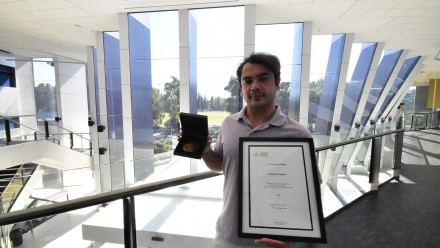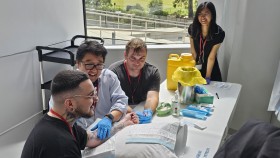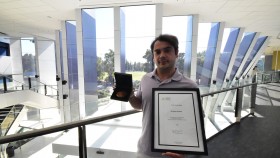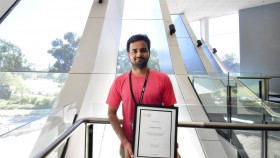JCSMR Director Simon Foote elected Fellow of the Australian Academy of Science
The Australian Academy of Science has recognised two scientists from The Australian National University (ANU) for their work on advancing science.
Professor Susan Scott from the ANU Centre for Gravitational Physics, and Professor Simon Foote, Director of The John Curtin School of Medical Research, have been elected as new Fellows of the Academy in recognition of their significant contributions to science.
ANU Vice-Chancellor Professor Brian Schmidt AC congratulated the new Fellows and said their work highlights the quality of research being done at ANU.
"I congratulate both Susan and Simon, not only on their own career achievements, but also their pioneering research and the excellent example they have set for the next generation of scientists," Professor Schmidt said.
The Academy's total fellowship now includes 511 scientists.
Professor Scott was recognised for her ground-breaking discoveries in the fields of general relativity and gravitational wave science, while Professor Foote was recognised for his work to fight malaria.
Professor Scott's theoretical work includes advancing our understanding of both singularities and the global structure of space-time.
She has also been a pioneer in the analysis of astrophysical signatures in gravitational wave experiments.
"I am delighted to have been elected a Fellow of the Academy. This award is a wonderful recognition of my research work to probe the structure of space-time and the nature of gravitational waves," she said.
"As the first gravitational wave scientist to enter the Academy, I really hope that this will highlight our new field of gravitational wave astronomy.
"The detection of gravitational waves is a discovery that most of us could only dream of happening in our working lifetime in research. To have that happen at this point in my career is amazing. I've had 20 years working on this project and now I have the rest of my career to see where this discovery leads."
Professor Foote's research is focused around trying to find new drugs to treat malaria by studying the malaria parasite's biological pathways.
"It's really exciting to think that our research could have an enormous impact on the world," Professor Foote said.
"I am a medical doctor and a researcher, and my contribution is trying to develop drugs that will treat millions of people. If I could develop a drug with my team that could prevent people from dying, that would fill me with an enormous degree of satisfaction."
Professor Foote has made significant contributions to a number of scientific disciplines throughout his career.
He produced the first physical map of a human chromosome and was instrumental in the subsequent map of the human genome that was crucial for the sequencing of the human genome.
Professor Foote has mapped the genetic loci for many diseases and has found a new function for the platelet, as a hunter killer cell against malaria.
Academy of Science President Professor Andrew Holmes congratulated all of the new Fellows and said they had made significant and lasting impacts in their scientific disciplines.
"The breadth of scientific talent recognised in this year's election is truly awe-inspiring," Professor Holmes said.
"From breakthroughs in pure science to spurring scientific innovations, these new Fellows have made an impact on everything from the way we treat disease to how we grow our food to advancing our fundamental knowledge about the world in which we live."















